Welcome to Jecheon! Often referred to as the “Healing City,” Jecheon is a haven for those seeking a respite from the frenetic pace of urban life. Its landscape is adorned with majestic mountains, serene lakes, and lush forests, making it a picturesque destination that captivates the soul.
source: LIVE TRAVEL ASIA on YouTube
Jecheon’s allure doesn’t end with its natural beauty. From the ancient Uirimji Reservoir, one of Korea’s oldest irrigation systems, to the vibrant Jecheon International Music & Film Festival, the city provides a diverse array of experiences that cater to all interests.
Whether you’re an adventure enthusiast eager to hike the trails of Woraksan National Park, a culture aficionado interested in exploring traditional villages, or a foodie looking to indulge in unique culinary delights, Jecheon has plenty on tap.
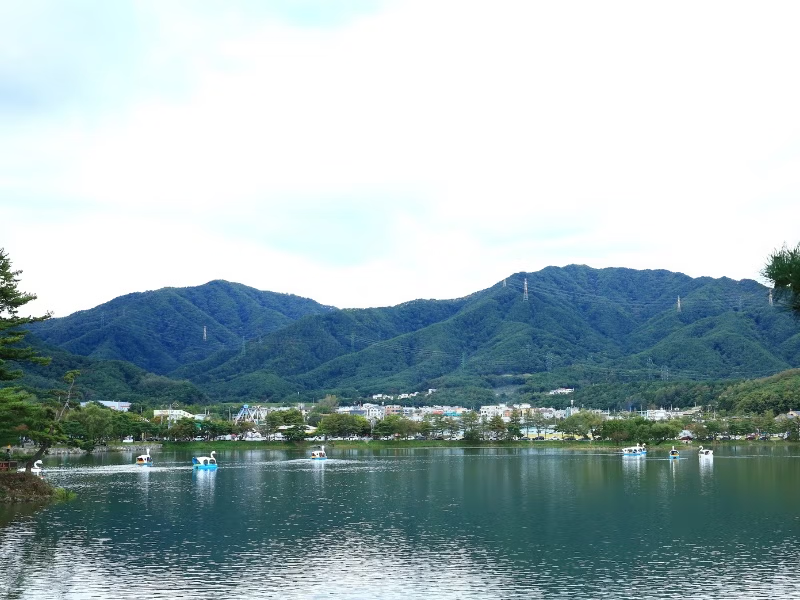
Why Visit Jecheon?
- Natural Splendor: Experience breathtaking landscapes, including mountains, lakes, and forests.
- Cultural Richness: Immerse yourself in traditional Korean heritage and vibrant festivals.
- Wellness and Healing: Discover the city’s reputation as a hub for oriental medicine and holistic wellness practices.
Tip: Allocate at least three to four days to fully explore Jecheon’s offerings and to allow yourself time to relax and soak in the healing atmosphere.
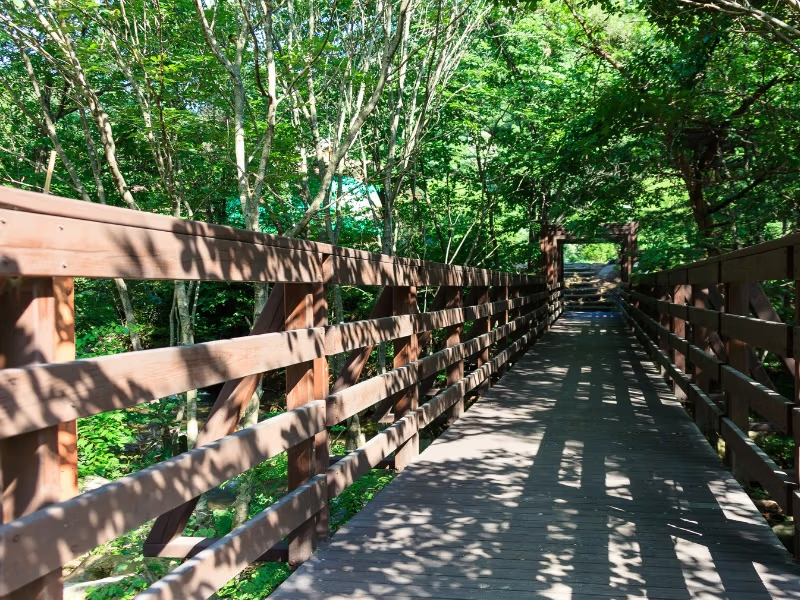
Top 10 Things To Do in Jecheon, Korea For Visitors
Here are some of the best things to do in Jecheon:
1. Explore Cheongpung Lake
Cheongpung Lake is a vast reservoir that stretches across Jecheon, offering a serene escape into nature’s embrace. Surrounded by rolling hills and dotted with small islands, the lake is a canvas of ever-changing colors and moods. The calm waters reflect the sky and the surrounding greenery, creating a mirror-like surface that’s a photographer’s dream.
You can embark on a leisurely boat tour that takes you around the lake, providing panoramic views of the stunning landscapes. The boat tours often include stops at various points of interest, such as small islands or historical sites submerged underwater due to the dam’s construction. Fishing enthusiasts will find designated spots where they can cast a line and relax by the water’s edge. For those who prefer land-based activities, the lakeside trails are perfect for walking, jogging, or cycling, offering fresh air and scenic vistas at every turn.
Beyond its natural beauty, Cheongpung Lake holds historical significance. The creation of the lake led to the submersion of ancient villages, and remnants of these communities can sometimes be seen when water levels are low. This adds a layer of mystery and poignancy to the lake, reminding visitors of the area’s rich past.
- Boat Tours: Choose from standard sightseeing boats or traditional Korean-style boats for a unique experience.
- Fishing Spots: Obtain a temporary fishing license and enjoy catching species like carp and catfish.
- Lakeside Trails: Rent a bicycle from local vendors and explore the extensive network of paths.
Tip: Visit the lake during different times of the day to appreciate how the light changes the scenery—sunrise and sunset are particularly spectacular!
2. Visit Uirimji Reservoir
The Uirimji Reservoir is not just a body of water; it’s a living piece of history. Dating back over 1,300 years, it is one of Korea’s oldest irrigation reservoirs, constructed during the Three Kingdoms period. The reservoir has been instrumental in supporting local agriculture and stands as a testament to ancient engineering prowess.
Surrounded by willow trees and adorned with quaint bridges and pavilions, Uirimji offers a tranquil setting that’s ideal for leisurely walks. The wooden walkways meander around the reservoir, providing picturesque views from various angles. You’ll find locals and tourists alike feeding the abundant carp that swim near the surface, a tradition believed to bring good luck.
Throughout the year, Uirimji transforms with the seasons. In spring, cherry blossoms add a splash of pink, while autumn paints the surroundings with hues of red and gold. The reservoir is also a popular spot for photographers and artists who come to capture its serene beauty.
- Historical Significance: Interpretive signs provide information about the reservoir’s history and construction techniques.
- Scenic Walkways: Benches along the paths offer spots to rest and take in the views.
- Local Wildlife: Besides carp, you might spot ducks, herons, and other bird species.
Tip: Bring some bread or purchase fish food from nearby vendors to feed the carp—they’re a delight to watch as they gather near the surface!
3. Hike in Woraksan National Park
Woraksan National Park is a paradise for nature lovers and adventure seekers. Covering an area of over 287 square kilometers, the park is home to Mount Worak, which rises to 1,094 meters above sea level. The mountain’s rugged peaks, dense forests, and clear streams make it an ideal destination for hiking and exploring the great outdoors.
The park offers a variety of trails catering to different skill levels. Novice hikers can enjoy gentle paths that wind through the forest, while experienced trekkers might opt for the more challenging routes that lead to the summit. Along the way, you’ll encounter diverse flora, including rare plants and wildflowers, as well as fauna such as deer, squirrels, and a variety of bird species.
At the summit, hikers are rewarded with panoramic views of the surrounding mountains and valleys. On clear days, you can see as far as the distant cities and even catch a glimpse of Cheongpung Lake. The fresh mountain air and the sense of accomplishment make the journey well worth the effort.
- Diverse Trails: Trails are well-marked, and maps are available at the park entrance.
- Scenic Views: Observation decks provide perfect spots for photography.
- Wildlife Watching: Early morning hikes increase your chances of spotting wildlife.
Tip: Ensure you’re well-prepared with appropriate hiking gear, water, and snacks. Check weather conditions before you set out, as trails can be slippery after rain!
4. Experience the Jecheon International Music & Film Festival (JIMFF)
The Jecheon International Music & Film Festival (JIMFF) is a unique cultural event that seamlessly blends the art of cinema with the universal language of music. Held annually in August, the festival transforms Jecheon into a vibrant hub of creativity and entertainment, attracting artists, filmmakers, and audiences from around the world.
JIMFF showcases a curated selection of films that focus on music as a central theme. Screenings take place in various venues, including indoor theaters and outdoor spaces like the picturesque Cheongpung Lake. The outdoor screenings offer a magical experience, where you can watch films under the stars with the lake and mountains as a backdrop.
In addition to film screenings, the festival features live concerts, workshops, and interactive sessions. Renowned musicians perform across genres, from classical and jazz to indie and world music. Workshops provide opportunities to engage with filmmakers and musicians, offering insights into their creative processes.
- Film Screenings: Check the schedule for premiere showings and special presentations.
- Live Concerts: Attend evening concerts that often feature surprise guest performers.
- Workshops: Participate in discussions and Q&A sessions with industry professionals.
Tip: Purchase a festival pass for access to multiple events and consider booking accommodations early, as hotels fill up quickly during the festival!
5. Discover Cheongpung Cultural Heritage Complex
The Cheongpung Cultural Heritage Complex is a meticulously crafted open-air museum that preserves and showcases traditional Korean architecture and artifacts. When the construction of the Cheongpung Dam led to the submersion of several historical sites, efforts were made to relocate and restore these structures, culminating in the creation of this complex.
Visitors can wander through the complex’s grounds, exploring various buildings that date back to the Joseon Dynasty. These include noblemen’s residences, government offices, schools, and pavilions. The buildings are furnished with period-appropriate artifacts, providing a vivid portrayal of life in ancient Korea.
Throughout the year, the complex hosts cultural performances, including traditional music, dance, and reenactments of historical events. Interactive exhibits and workshops allow visitors to engage in activities like calligraphy, traditional games, and crafts. It’s an educational and immersive experience that brings history to life.
- Traditional Buildings: Guided tours are available for a more in-depth understanding of each structure.
- Cultural Performances: Check the schedule for performance times, especially on weekends.
- Educational Exhibits: Information panels and interactive displays enhance the learning experience.
Tip: Wear comfortable clothing and allow at least half a day to fully explore the complex and participate in activities!
6. Relax at Jecheon Oriental Medicine Expo Park
Embrace wellness at the Jecheon Oriental Medicine Expo Park, a unique attraction dedicated to the practice and principles of traditional Korean medicine. The park spans over 2 million square meters and offers a variety of experiences designed to promote health and relaxation.
Start your visit at the exhibition halls, where interactive displays explain the history, theories, and applications of oriental medicine. You’ll learn about the importance of balance and harmony in maintaining health, as well as the roles of different herbs and treatments.
The park features beautifully landscaped herbal gardens showcasing over 1,000 species of medicinal plants. Stroll through the gardens, breathe in the aromatic scents, and learn about each plant’s properties. Wellness centers within the park offer treatments such as herbal foot baths, acupuncture, and moxibustion performed by licensed practitioners.
- Herbal Gardens: Guided tours provide in-depth knowledge about medicinal plants.
- Wellness Programs: Book treatments in advance to secure a spot.
- Educational Exhibits: Interactive displays make learning engaging and fun.
Tip: Take advantage of the free health assessments offered at the park to gain personalized wellness insights!
7. Take a Ride on the Cheongpung Cable Car
The Cheongpung Cable Car offers an exhilarating journey to the summit of Bibongsan Mountain, providing unparalleled views of Jecheon’s natural beauty. The cable car spans a distance of 2.3 kilometers and rises to an altitude of 531 meters, making it one of the longest and highest cable cars in Korea.
As you ascend, the glass-enclosed cabins offer 360-degree views of Cheongpung Lake, the surrounding mountains, and the sprawling landscapes below. The ride takes about 10 minutes, during which you can capture stunning photos or simply marvel at the scenery.
At the summit, multiple observation decks and viewing platforms await. There’s also a skywalk with a glass floor for the more adventurous visitors. Facilities at the top include cafes, souvenir shops, and rest areas. Hiking trails are available for those who wish to explore further or even hike back down the mountain.
- Stunning Views: Ideal for panoramic photography—bring a wide-angle lens if possible.
- Summit Facilities: Enjoy refreshments while soaking in the views.
- Nature Trails: Short trails lead to different viewpoints and are suitable for all ages.
Tip: Weekdays are less crowded, offering a more peaceful experience. Check operating hours and weather conditions before planning your visit!
8. Visit Jecheon Herb Land
Jecheon Herb Land is a delightful attraction that combines horticulture with wellness and education. Spread over 330,000 square meters, the park features themed gardens, greenhouses, and interactive exhibits dedicated to the cultivation and use of herbs.
Visitors can wander through the Herb Theme Park, where plants are organized based on their uses and characteristics. From culinary herbs like basil and rosemary to medicinal plants like ginseng and mint, the diversity is impressive. Informational plaques provide details about each herb’s properties and applications.
The on-site Herb Museum offers deeper insights into the history of herbal medicine and the role of herbs in different cultures. Workshops and classes are available for those interested in hands-on experiences, such as making herbal soaps, candles, or teas.
The park’s Herbal Restaurant serves dishes that incorporate fresh herbs harvested from the gardens. The menu features unique offerings like herb-infused pastas, salads, and teas, providing a culinary experience that’s both delicious and health-conscious.
- Guided Tours: Learn from experts about herb cultivation and uses.
- Herbal Cuisine: Try signature dishes like lavender ice cream or rosemary chicken.
- Workshops: Suitable for all ages—advance booking is recommended.
Tip: Visit during the herb festival season when the park hosts special events, markets, and performances!
9. Explore the Uirimji Agricultural Museum
The Uirimji Agricultural Museum offers a fascinating glimpse into Korea’s agrarian past. Located near the historic Uirimji Reservoir, the museum is dedicated to preserving and showcasing traditional farming techniques, tools, and the evolution of agriculture in the region.
The museum’s exhibits are thoughtfully arranged to take visitors on a chronological journey. You’ll see ancient farming implements made from wood and stone, models of traditional irrigation systems, and displays highlighting the seasonal cycles of farming life. Interactive exhibits allow visitors to try their hand at grinding grains or using simple tools.
Special sections focus on rice cultivation, a staple of Korean agriculture, and the importance of community cooperation in farming practices. Multimedia presentations and dioramas depict scenes from rural life, festivals, and rituals associated with agriculture.
- Historical Exhibits: Detailed descriptions are provided in multiple languages.
- Interactive Displays: Engaging for children and adults alike.
- Cultural Insight: Learn about the social and economic impact of agriculture on Korean society.
Tip: Combine your visit with a stop at the nearby Uirimji Reservoir to fully appreciate the significance of water management in farming!
10. Enjoy Water Sports at Cheongpung Lake Water Sports Center
For thrill-seekers and water enthusiasts, the Cheongpung Lake Water Sports Center offers a plethora of activities set against the backdrop of Jecheon’s stunning landscapes. The center provides equipment rentals and professional instruction for a variety of water sports suitable for all ages and skill levels.
Experience the rush of jet skiing as you zip across the expansive lake, or challenge yourself with water skiing, feeling the exhilaration as you glide over the water’s surface. Banana boat rides and tubing are perfect for groups and families, offering laughter-filled adventures.
Safety is a top priority at the center, with certified instructors providing guidance and ensuring that all activities are conducted with proper safety gear. Even beginners can quickly get the hang of the sports with professional coaching.
- Jet Skiing: High-speed fun with options for single or double riders.
- Banana Boat Rides: Group activity that accommodates up to 10 people.
- Water Skiing/Wakeboarding: Lessons available for first-timers.
Tip: Wear appropriate swimwear and consider bringing a waterproof camera to capture the fun moments!

What To Eat and Drink in Jecheon, South Korea
Savor Traditional Korean Dishes
Jecheon’s culinary scene is a delightful exploration of traditional Korean flavors, emphasizing fresh, locally sourced ingredients. The city’s restaurants range from bustling markets and street food stalls to elegant dining establishments, each offering a unique taste of Korean cuisine.
One must-try dish is Memil Jeonbyeong, buckwheat crepes filled with a variety of fillings such as seasoned vegetables, kimchi, or minced meat. The crepes are thin and slightly chewy, providing a delightful texture that pairs well with the savory fillings. Pajeon, a green onion pancake, is another local favorite. Crispy on the outside and tender inside, it’s often enjoyed with a soy-based dipping sauce.
No Korean meal is complete without banchan, an array of side dishes that may include kimchi, pickled vegetables, seasoned seaweed, and more. These accompaniments add depth and variety to the meal, allowing diners to experience a range of flavors in one sitting.
- Memil Jeonbyeong (Buckwheat Crepes): Often served at local markets—try them fresh off the griddle.
- Pajeon (Green Onion Pancake): Best enjoyed with a group, as it’s typically a generous portion.
- Makgeolli (Rice Wine): Pairs well with savory dishes and is traditionally served in a communal bowl.
Tip: Visit the Jecheon Traditional Market to sample a variety of dishes in one place and to experience the lively atmosphere of local commerce!
Experience Jecheon’s Herbal Cuisine
Jecheon’s reputation as a center for oriental medicine extends to its culinary offerings. Herbal cuisine is a specialty in the city, with restaurants incorporating medicinal herbs into their dishes to promote health and wellness.
Yaksan Jeongol, an herbal hot pot, is a hearty stew made with a rich broth infused with various herbs, vegetables, and meats. It’s believed to boost vitality and is especially popular during the colder months. Omija Tea, made from the “five-flavor berry,” offers a unique taste experience that combines sweet, sour, bitter, salty, and spicy notes. This tea is not only refreshing but also valued for its health benefits.
Herbal Bibimbap is a nutritious take on the classic mixed rice dish, incorporating a variety of herbs and edible plants. The combination of flavors and textures makes for a satisfying meal that’s both delicious and nourishing.
- Yaksan Jeongol (Herbal Hot Pot): Ideal for sharing; the communal aspect enhances the dining experience.
- Omija Tea: Available hot or cold; try both to appreciate the different flavor profiles.
- Herbal Bibimbap: Look for restaurants specializing in temple cuisine for authentic preparations.
Tip: Don’t hesitate to ask restaurant staff about the herbs used in your meal—they’re often happy to explain the health benefits and culinary uses!
Indulge in Freshwater Fish Dishes
Jecheon’s proximity to lakes and rivers means that freshwater fish plays a significant role in the local diet. Restaurants specializing in seafood offer dishes that highlight the fresh, delicate flavors of fish caught in nearby waters.
Maeuntang, a spicy fish stew, is a robust dish made with fresh fish, vegetables, tofu, and a spicy red pepper paste broth. It’s a comforting meal that’s particularly satisfying on cooler days. Grilled Trout is prepared simply, often seasoned with just salt and pepper to let the natural flavor shine through. Steamed Carp is another delicacy, sometimes cooked with medicinal herbs for added flavor and health benefits.
- Maeuntang (Spicy Fish Stew): Adjust the spiciness level to your preference when ordering.
- Grilled Trout: Often served whole; don’t be afraid to dig in with chopsticks and savor every part.
- Steamed Carp: May be served with a variety of side dishes to complement the mild flavor.
Tip: For the freshest experience, visit restaurants located near the lakes or rivers where the fish are sourced!
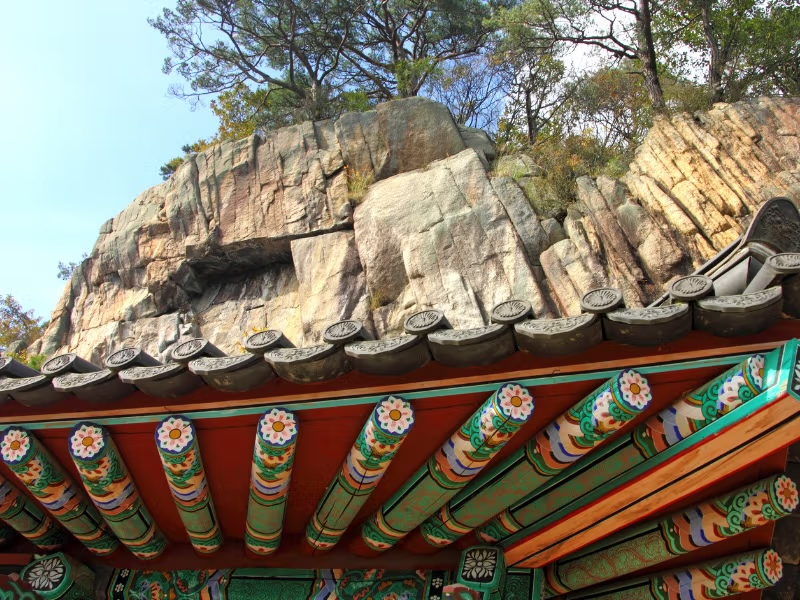
Tours For Visitors To Jecheon, Korea
Join a Cultural Heritage Tour
A Cultural Heritage Tour in Jecheon is an enriching experience that delves into the city’s historical and cultural landmarks. Led by knowledgeable guides, these tours offer insights into Jecheon’s past, traditions, and the stories behind its most significant sites.
The tour typically includes visits to the Cheongpung Cultural Heritage Complex, where you’ll explore ancient buildings and learn about traditional Korean architecture. You’ll also visit temples like Semyung University Museum and Baeron Holy Ground, each offering unique perspectives on the region’s religious and educational history.
Interactive elements are often part of the tour, such as participating in a traditional tea ceremony or learning basic calligraphy. These hands-on experiences deepen your connection to the culture and provide memorable moments.
- Expert Guides: Multilingual guides are often available—request one in your preferred language.
- Historical Sites: Tours may include lesser-known gems not typically found in guidebooks.
- Cultural Activities: Opportunities to wear traditional Korean attire (hanbok) or try local crafts.
Tip: Book your tour through reputable agencies and inquire about customizable options to focus on areas of particular interest to you!
Embark on an Oriental Medicine Tour
The Oriental Medicine Tour is a unique offering that highlights Jecheon’s status as a hub for traditional Korean medicine. This tour is both educational and rejuvenating, providing insights into holistic health practices.
You’ll start by visiting the Oriental Medicine Expo Park, exploring exhibits on the history and principles of oriental medicine. The tour often includes a stop at a herbal market, where you can see, smell, and even purchase a wide array of medicinal herbs.
Participants may have the opportunity to experience treatments such as acupuncture, herbal foot baths, or aromatherapy sessions. Some tours also offer workshops where you can make your own herbal remedies or learn about medicinal cooking.
- Herbal Markets: Guides can help explain the uses of various herbs and negotiate purchases.
- Wellness Centers: Treatments are administered by certified professionals in hygienic settings.
- Educational Sessions: Learn about balancing energies and maintaining health through diet and lifestyle.
Tip: Inform your tour operator of any allergies or health conditions in advance to tailor the experience to your needs!
Adventure Tours in Nature
Jecheon’s natural landscapes make it an ideal destination for Adventure Tours that get your adrenaline pumping. These tours are perfect for outdoor enthusiasts looking to experience the region’s beauty while engaging in exciting activities.
Options include hiking expeditions in Woraksan National Park, where guides lead you through trails that reveal hidden waterfalls, rock formations, and panoramic viewpoints. Rock climbing and abseiling are available for those seeking a vertical challenge, with routes suitable for beginners to advanced climbers.
Water-based activities are also popular. Kayaking or canoeing on Cheongpung Lake provides a peaceful way to explore the water, while white-water rafting on nearby rivers offers thrills for adventure seekers.
- Hiking Expeditions: Equipment like trekking poles and backpacks can often be rented.
- Water Sports: Safety equipment is provided, and instructors ensure you are comfortable with the activities.
- Camping Trips: Overnight tours include tents, meals, and campfire experiences.
Tip: Always follow the safety instructions provided by your guides and ensure you have appropriate travel insurance for adventure activities!
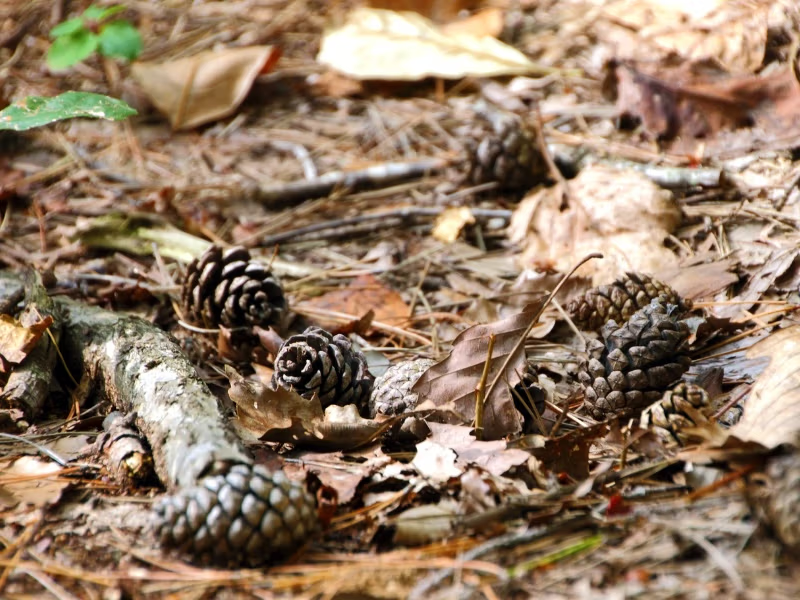
Jecheon Accommodations Guide: Hotels, Guesthouses, and Hostels
Comfortable Hotels for a Relaxing Stay
Jecheon’s hotels provide a range of options for travelers seeking comfort, convenience, and modern amenities. Many hotels are strategically located near key attractions, transportation hubs, and offer services that cater to both leisure and business travelers.
The Jecheon Tourist Hotel is renowned for its spacious rooms, courteous staff, and facilities like fitness centers and business lounges. Resort hotels located near Cheongpung Lake offer stunning views and additional amenities such as swimming pools, spas, and on-site restaurants serving local and international cuisine.
For those who value sustainability, some hotels in Jecheon have adopted eco-friendly practices, such as energy-efficient systems and locally sourced products. These establishments often provide information about their environmental initiatives, appealing to environmentally conscious travelers.
- Jecheon Tourist Hotel: Offers room service, concierge assistance, and tour booking services.
- Resort Hotels: May include recreational activities like golf courses or water sports facilities.
- Business Hotels: Provide meeting rooms, high-speed internet, and express check-in/check-out.
Tip: Sign up for hotel membership programs or newsletters to receive special offers, discounts, and updates on events!
Experience Authenticity in Guesthouses
Staying at a guesthouse or hanok (traditional Korean house) offers an immersive cultural experience. These accommodations provide a homey atmosphere and often include personal touches from the hosts.
Guesthouses typically feature traditional architecture, with elements like paper sliding doors, wooden beams, and heated floors (ondol). Sleeping arrangements might include comfortable floor mattresses (yo) rather than Western-style beds. Hosts often prepare homemade breakfasts featuring local ingredients, adding to the authentic experience.
Many guesthouses are located in scenic areas, offering tranquil surroundings away from the city’s hustle and bustle. Some also provide cultural activities such as kimchi-making classes, traditional music performances, or tea ceremonies.
- Homestays: Engage with local families and learn about daily life in Jecheon.
- Cultural Workshops: Participate in hands-on activities exclusive to guests.
- Scenic Locations: Enjoy views of mountains, lakes, or historical sites right from your doorstep.
Tip: Respect the house rules, such as removing shoes indoors and observing quiet hours, to ensure a pleasant stay for everyone!
Budget-Friendly Hostels for Travelers
For travelers on a budget, Jecheon’s hostels offer affordable accommodation without compromising on cleanliness or safety. Hostels are popular among backpackers and solo travelers looking to meet others and share experiences.
Hostels in Jecheon often provide a mix of dormitory-style rooms and private rooms. Common areas like lounges, kitchens, and rooftops encourage social interaction. Some hostels organize group activities or tours, making it easy to explore the city and its surroundings with new friends.
Facilities typically include free Wi-Fi, laundry services, luggage storage, and sometimes complimentary breakfast. Staff at hostels are usually well-versed in local attractions and can provide valuable tips and recommendations.
- Affordable Rates: Save money on lodging to allocate more budget for activities and dining.
- Social Environment: Participate in hostel events like movie nights or BBQ parties.
- Basic Facilities: Access to kitchenettes allows you to prepare simple meals.
Tip: Bring a padlock for securing your belongings in lockers and consider earplugs if you’re staying in a shared dormitory!
source: VISITKOREA on YouTube
Day Trips From Jecheon, South Korea
Explore the Charming Town of Danyang
A short trip from Jecheon, Danyang offers a wealth of natural and cultural attractions. Known for its picturesque landscapes, Danyang is a haven for photographers and nature enthusiasts.
Visit the Gosu Cave, a limestone cave over 1,700 meters long, featuring impressive stalactites and stalagmites formed over millions of years. The well-lit paths and informative signs make it accessible and educational.
The Mancheonha Skywalk is an exhilarating experience, featuring a U-shaped glass-bottom platform suspended over a cliff, 80 meters above the ground. The panoramic views of the Namhan River and surrounding mountains are breathtaking.
In the evening, the Suyanggae Light Tunnel transforms an old railway tunnel into a spectacular light show. The tunnel features themed sections with LED displays, music, and interactive elements, providing a magical experience for visitors of all ages.
- Gosu Cave: Wear comfortable shoes and a light jacket, as it can be cool inside.
- Skywalk: Not for the faint-hearted—those afraid of heights may find it challenging.
- Light Tunnel: Perfect for families and couples; consider visiting on weekdays to avoid crowds.
Tip: Purchase a combined ticket for multiple attractions in Danyang to save money and streamline your visit!
Visit the Historic City of Andong
Andong is a city rich in history and tradition, often referred to as the cultural heart of Korea. It’s home to the Hahoe Folk Village, a UNESCO World Heritage site that preserves the architecture and lifestyle of the Joseon Dynasty.
At Hahoe Village, you can walk among traditional thatched-roof houses and observe residents maintaining age-old customs. The village also hosts mask dance performances, showcasing traditional storytelling through music and dance.
The Andong Mask Dance Festival is an annual event that attracts visitors worldwide. The festival features performances not only from Korea but also from other countries, promoting cultural exchange and appreciation.
- Hahoe Folk Village: Guided tours are available for deeper insights.
- Mask Dance Festival: Check the festival dates, usually held in late September to early October.
- Local Cuisine: Don’t miss trying Andong Jjimdak, a savory braised chicken dish with vegetables and noodles.
Tip: Allocate a full day for Andong to fully experience its offerings, and consider staying overnight to explore more!
Discover the Beauty of Songnisan National Park
Songnisan National Park is renowned for its natural beauty and cultural heritage. The park’s name means “remote from the ordinary world,” reflecting its serene environment.
The highlight is the Beopjusa Temple, a significant Buddhist temple established in the 7th century. The temple complex includes the towering Golden Maitreya Buddha Statue, standing 33 meters tall. The intricate craftsmanship and peaceful ambiance make it a place of reflection and admiration.
The park offers various hiking trails that cater to different fitness levels. Trails lead through dense forests, past clear streams, and up to peaks offering panoramic views. The Munjangdae Peak is a popular destination, providing stunning vistas especially during sunrise and sunset.
- Beopjusa Temple: Modest attire is recommended as it’s an active place of worship.
- Hiking Trails: Trail maps are available at the park entrance—follow marked paths for safety.
- Wildlife: Keep an eye out for wildlife but maintain a respectful distance.
Tip: Visit during weekdays to avoid crowds, and consider the park’s shuttle bus service to reach trailheads more efficiently!
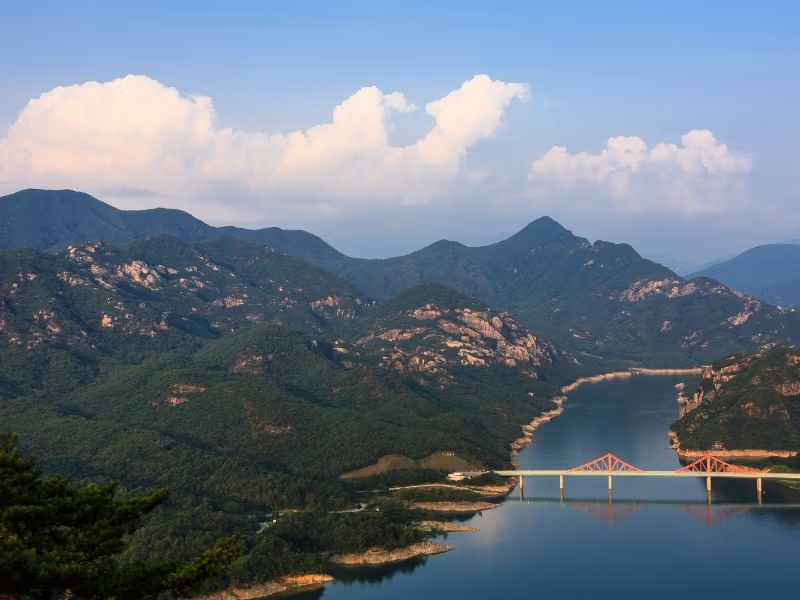
Jecheon Transportation Guide
Getting to Jecheon
Jecheon’s central location in South Korea makes it accessible via various modes of transportation.
By Train: The Jungang Line connects Jecheon to major cities like Seoul and Busan. The Mugunghwa and ITX-Saemaeul trains offer comfortable seating and amenities. The journey from Seoul takes approximately 2.5 hours, providing scenic views of the countryside.
By Bus: Express and intercity buses run frequently to Jecheon from major bus terminals. The buses are modern, with reclining seats and sometimes onboard Wi-Fi. The bus from Seoul’s Dong Seoul Bus Terminal takes about 2 hours.
By Car: Renting a car gives you the flexibility to explore at your own pace. Highways are well-maintained, and GPS navigation is available in multiple languages. Be aware of toll fees and parking availability in the city.
- By Train: Tickets can be purchased online or at the station—consider booking in advance during peak seasons.
- By Bus: Bus terminals have English signage, and staff can assist with ticket purchases.
- By Car: International Driving Permit (IDP) is required—ensure your rental includes insurance.
Tip: Download the Korail and Express Bus mobile apps for easy ticket booking and schedule checks!
Navigating Within Jecheon
Getting around Jecheon is convenient thanks to its well-organized transportation system.
Public Buses: The city’s bus network covers most tourist attractions, residential areas, and commercial districts. Buses are numbered and have routes displayed in English and Korean. Fares are affordable, and buses are clean and punctual.
Taxis: Taxis are abundant and can be hailed on the street or found at designated taxi stands. Fares are metered, and most drivers are honest and friendly. For longer distances, consider agreeing on a fare beforehand.
Bicycle Rentals: Some parks and tourist areas offer bicycle rentals. Cycling is a pleasant way to explore the city, especially along designated bike paths near lakes and parks.
- Public Buses: Use a transportation card like T-money or pay with exact change.
- Taxis: Carry a business card or have your destination written in Korean to show the driver.
- Bicycle Rentals: Bring a helmet if possible, as not all rental services provide one.
Tip: Consider downloading a local transit app or using Naver Maps for real-time navigation and bus schedules!
Transportation Tips for Tourists
Navigating a new city can be challenging, but a few tips can make your travel smoother.
- Use Apps: Translation apps like Papago can help communicate with drivers or read signs.
- Carry Cash: While cards are widely accepted, having cash is useful for small purchases or in places that don’t accept cards.
- Learn Basic Phrases: Simple greetings and phrases in Korean can enhance your interactions and are appreciated by locals.
Tip: Always keep the address of your accommodation handy, preferably written in Korean, in case you need assistance returning!
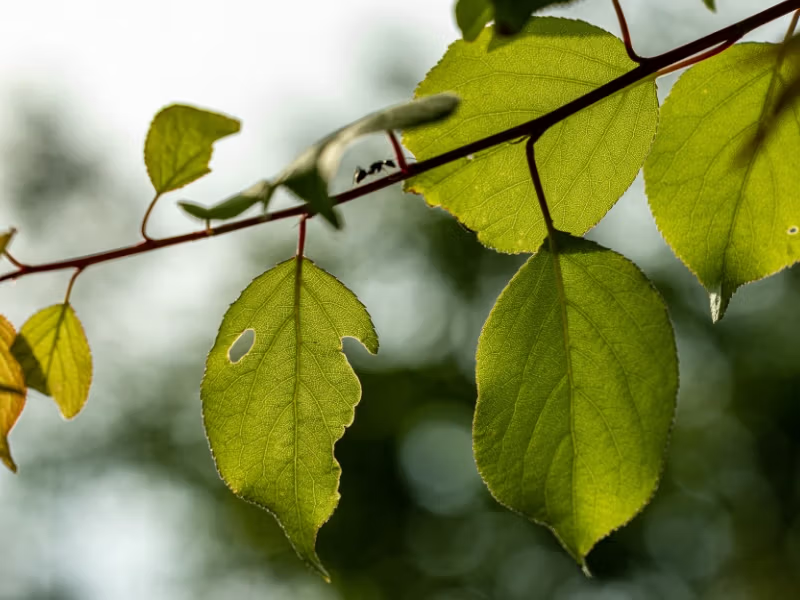
Essential Questions About Visiting Jecheon, South Korea: Practical Answers, Healing Vibes & Trip-Planning Tips
Is Jecheon really worth visiting if I only have a week in Korea?
Absolutely. If your idea of a great trip includes lakes, mountains, and breathing room between big-city days, Jecheon punches above its weight. I think it’s one of those places that feels like a reset button—especially after Seoul or Busan.
It’s also a nice “culture meets nature” combo: historical water systems like Uirimji, heritage sites near Cheongpung, and a strong wellness identity that makes the whole destination feel intentionally calming.
How many days should I plan for Jecheon?
It depends. A solid 2 days gives you time for Cheongpung Lake, Uirimji Reservoir, and one cultural stop. But if you want to hike Woraksan, explore wellness spots, and take things slowly, 3–4 days is the sweet spot.
Jecheon is at its best when you’re not rushing. The whole “Healing City” vibe lands way better when you build in downtime.
What’s the best time of year to visit Jecheon?
Spring and autumn are the easy winners. You’ll get comfortable hiking weather, beautiful lakeside walks, and those classic Korean seasonal colors.
Summer works well too if you’re here for lake activities and festivals, but expect humidity. Winter can be peaceful and photogenic, though some outdoor experiences will be more limited.
What are the absolute must-dos for first-time visitors?
If I had to narrow it down, I’d prioritize:
- Cheongpung Lake for scenic cruising or lakeside walks.
- Uirimji Reservoir for that “ancient history meets park stroll” feel.
- Cheongpung Cultural Heritage Complex for a deeper historical lens.
- One nature hit—either Woraksan hiking or a lighter trail.
That combo gives you Jecheon’s essence without needing a packed schedule.
Is Woraksan National Park good for beginner hikers?
Yes. While the park has challenging routes, you can absolutely tailor your day to your fitness level. I’d treat it like a choose-your-own-adventure hike: shorter forest trails if you want a gentle day, or bigger summit ambitions if you’re ready to earn your views.
Bring layers, water, and grippy shoes. If it has rained recently, expect some slick sections.
Do I need a car in Jecheon?
Not really. You can cover a lot with local buses and taxis, especially around central areas and major attractions. For places further out—like more remote lakeside viewpoints—having a car adds convenience, but it’s not mandatory.
If you’re planning a relaxed itinerary, public transport plus the occasional taxi works just fine.
Where should I stay: downtown Jecheon or near Cheongpung Lake?
It depends. Downtown is best if you want easy access to everyday dining, markets, and transport connections. Cheongpung Lake area is the move if you’re chasing scenic views and a slower, resort-style trip.
I lean lake-side for couples or anyone planning a wellness-focused escape, and downtown for practical, transit-friendly sightseeing.
Is Jecheon family-friendly?
Yes. The attractions here are naturally kid-compatible: lakeside parks, gentle walking paths, cultural sites that aren’t too intense, and plenty of space to run around.
Water activities at Cheongpung Lake can be a highlight for older kids. Just keep life jackets, sun protection, and snack breaks in the game plan.
How accessible is Jecheon for travelers with mobility concerns?
Not really. Some areas around Uirimji and town parks are relatively easy, but heritage complexes, mountain trails, and certain lakeside spots can involve uneven ground or stairs.
If accessibility is a priority, I’d plan a more curated itinerary focused on flatter lakeside promenades, scenic stops you can reach by vehicle, and lower-effort cultural sites.
What should I eat in Jecheon that I might not find elsewhere?
Yes. You’ll find plenty of familiar Korean favorites, but Jecheon’s identity really shows up in its herbal-leaning food culture and local specialties.
I would seek out Memil Jeonbyeong (buckwheat crepes), herbal hot pots, and a good glass of makgeolli with savory pancakes. Pair that with a market visit and you’ll get a strong sense of place.
Is Jecheon expensive compared to Seoul?
Nope. Accommodation, meals, and local transport generally feel more budget-friendly than the major cities. You can have a comfortable mid-range day without feeling like every coffee and taxi is a financial decision.
If you splurge, it’ll likely be on a scenic resort stay near Cheongpung Lake or a bundled tour day.
Is the Jecheon International Music & Film Festival worth planning around?
Absolutely. If you like film, live music, and outdoor summer energy, it can be a really memorable way to experience the city.
Because it’s a peak-demand period, I’d book accommodation early and be flexible with viewing locations and event choices. Even if you don’t buy a full pass, dipping into one or two events can add a fun cultural layer to your trip.
What’s a lesser-known side trip or viewpoint around Jecheon?
Absolutely. If you want a simple wow-factor add-on, consider the Jecheon Oksunbong Suspension Bridge area. The bridge is a thrilling scenic stop near Oksunbong Peak, with a 222-meter span and a larger walking route that totals about 944 meters.
It has seasonal operating hours and a modest entry fee, which makes it an easy, low-commitment upgrade to a lake-and-mountains itinerary.
Any practical tips for enjoying Jecheon without speaking much Korean?
It depends. In tourist-facing areas you’ll be fine with basic English, but I still recommend having names of key spots saved in Korean on your phone.
I usually rely on translation apps for menus and quick questions, and I keep my accommodation address ready in Korean for taxi rides. The vibe here is friendly, so polite effort goes a long way.
Jecheon Travel Guide: Final Thoughts
Jecheon is a city that captivates visitors with its harmonious blend of natural beauty, cultural richness, and warm hospitality. From the tranquil shores of Cheongpung Lake to the historical depths of the Cheongpung Cultural Heritage Complex, every corner of Jecheon offers a new discovery.
The city’s commitment to wellness, evident in its herbal cuisine and oriental medicine practices, invites you to not just explore but also rejuvenate. Festivals like the Jecheon International Music & Film Festival showcase the city’s vibrant arts scene and its ability to bring people together through shared experiences.
Whether you’ve sought adventure on mountain trails, found peace in traditional temples, or connected with locals over a hearty meal, Jecheon leaves a lasting impression. It’s a place where memories are made, stories are shared, and the essence of Korea’s heartland is felt deeply.
- Memorable Adventures: Each attraction offers unique experiences that cater to diverse interests.
- Cultural Enrichment: Immersing yourself in local traditions provides a deeper appreciation of Korea’s heritage.
- Lasting Impressions: The warmth of Jecheon’s people and the beauty of its landscapes stay with you long after you’ve left.
Tip: Keep a journal or photo diary of your travels in Jecheon—it will be a cherished keepsake that allows you to relive your journey anytime!
